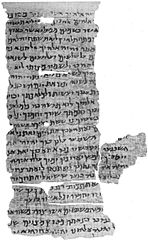Navigating the Old Testament

Many religious books were written by members of the religious communities of Israel and Judah, but over time, people of faith identified one group of books as being uniquely authoritative. This group of books became our Old Testament.
An important skill that all Christians can benefit from is being able to find your way through the books of the Bible. As our Bible is published today, the Old Testament is made up of thirty-nine books. At other times the books were grouped somewhat differently for instance I and II Samuel were originally one book but came to be divided into two separate books because the whole book was too long to fit on one normal-sized scroll.
Some Christian Churches recognize an additional set of books called the Apocrypha or Deuterocanonical books. We respect these books but do not put them in the same category as the Old and New Testaments.
It is probably good to note here that the chapter and verse divisions of the Bible only appeared long after the books were written. The division of the books of the Bible into chapters was probably derived from work done by Stephen Langton (d.1228). He was a professor at the University of Paris and later became the Archbishop of Canterbury in England. The first division of the Old Testament into numbered verses as we know them was published in 1509. The New Testament chapters were subdivided in 1551 by Robert Estienne, a printer. It is important to remember that these chapter and verse divisions are merely for our convenience and sometimes do not reflect the actual breaks in the text. Read more about the history of these subdivisions here.
Two Testaments
The Bible can be divided into two sections: those written before the birth of Jesus and those written afterward. We call the section written before the birth the Old Testament and those written afterward the New Testament.
As you may have figured out, Jewish people who do not include the life of Jesus as part of their faith do not include the New Testament in their Bible. Muslims also respect the same books that we do, but put them at a different level of authority than most Christians would.
At times Christians have disagreed about whether the New and Old Testaments should have the same authority. Some have even ignored the Old Testament all together. We believe that God speaks to us through both. If you are interested in some of the history of this debate, you can read about it here.
The Old Testament
Within the Old Testament there are thirty-nine books. We group them into five categories.
Five Books of Moses |
Genesis |
|
Twelve Books of History |
Joshua |
|
Five Books of Poetry |
Job |
|
Five Major (Longer) Prophets |
Isaiah |
|
Twelve Minor (Shorter) Prophets |
Hosea |
Learning the Order of the Books of the Old Testament
A good way to learn the order of the Old Testament books and the kind of contents that they have is to sing them to the tune of the song "Did You Ever See a Lassie."
Printable sheet music for The Books of the Old Testament
Let us sing the books of Moses, of Moses, of Moses,
Let us sing the books of Moses, for he wrote the law.
First, Genesis; second, Exodus; third, Leviticus; fourth, Numbers;
And the fifth is Deuteronomy, the last of them all.
Let us sing the books of history, of history, of history,
Let us sing the books of history, which tell of the Jews.
There's Joshua; and Judges; and the story of Ruth;
Then First and Second Samuel; and First and Second Kings;
Then First and Second Chronicles, which give us the records;
Then Ezra; Nehemiah; and Esther, the Queen.
Let us sing the books of poetry, of poetry, of poetry,
Let us sing the books of poetry, The songs the Jews sang.
Job the patient, Psalms of David, and the Proverbs of a wise one;
And then Ecclesiastes, and the Song of Solomon.
Let us sing the Major Prophets, Major Prophets, Major Prophets,
Let us sing the Major Prophets, there are five of them all.
Isaiah; Jeremiah, who wrote Lamentations;
Then Ezekiel; and Daniel, the last of them all.
Let us sing the Minor Prophets, Minor Prophets, Minor Prophets,
Let us sing the Minor Prophets, there are twelve of them all.
Hosea, Joel, Amos, Obadiah, Jonah, Micah, Nahum, Habakkuk,
Zephaniah, Haggai, Zechariah, Malachi.